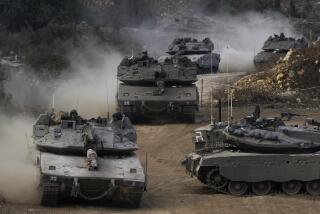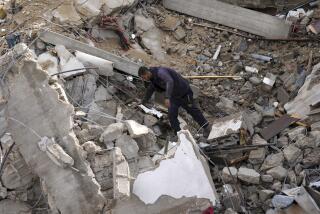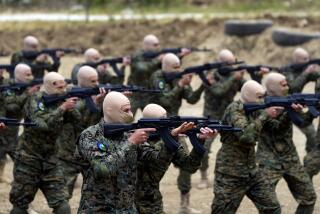Israelis Reportedly Kill 6 Presumed Terrorists
- Share via
JERUSALEM — In a pair of separate clashes, Israeli troops shot and killed six Palestinian guerrillas trying to infiltrate from the north and south Wednesday, including three who succeeded in breaching the border in the Negev Desert, military sources said.
In the Negev, in Israel’s far south, two members of the group of infiltrators were still at large, according to unconfirmed reports. A pursuing Israeli soldier was wounded in the clash that killed the three presumed terrorists, the reports said.
The latest incidents brought to four the number of attempted infiltrations since Saturday. At least three of the efforts, Israeli officials said, were made by Palestinian groups who oppose moves by the Palestine Liberation Organization to open peace talks with Israel.
Climate of Unease
The attacks, coupled with the sabotage of a Pan American jetliner blown up as it flew over Britain with 259 people aboard, led observers to ponder whether radical Palestinian groups were trying to create a climate of unease in order to undermine diplomacy aimed at settling the Middle East conflict.
It was not clear whether the guerrillas in the Negev came from Jordan or Egypt, both of which border Israel in the south. The penetration occurred between 6 and 7 p.m., sources said, with one unconfirmed report putting the crossing point at Ein Yahav, a settlement halfway between the Dead Sea and the Red Sea resort of Eilat along the Jordanian border.
Infiltration from Jordan would be unusual. The Jordanian army keeps a close watch on its frontier to prevent guerrillas from entering Israel bent on violence that might invite an Israeli retaliation against Jordan.
Attacks on Israeli settlements have originated from Egypt in the past, although Israeli officials are careful to point out that neither Egypt nor Jordan does anything to encourage attacks on Israel.
The Negev intrusion--for which no group has taken responsibility--followed by about 12 hours an attempt by three armed Palestinians to enter northern Israel from Lebanon. Israeli troops thwarted that assault, shooting the three as they approached the border fence near the Lebanese village of Meiss el Jabal, close to the Israeli farm settlement of Kibbutz Manara.
“Kalashnikov rifles, missiles, anti-tank launchers, ammunition and wire cutters were found on the terrorists,” an Israeli military spokesman said.
In the Lebanese port of Sidon, a spokesman for the Palestine Liberation Front, a PLO guerrilla faction, took responsibility and claimed that the infiltrators actually succeeded in entering Israel in the north. “The fighters clashed with the enemy, tens of meters inside Israel,” the official said.
On Monday, another heavily armed group of three Arabs tried to cross the border near Kibbutz Manara. All were killed by Israeli troops. The Jerusalem Post attributed the attack to the Revolutionary Council of Fatah, which is headed by the terrorist Abu Nidal and operates outside the PLO.
The day before, a rubber dinghy carrying four guerrillas sank in rough seas south of Beirut, Palestinian sources and news reports said. Three of the guerrillas drowned, but the fourth was saved.
The four guerrillas, from a radical pro-Syrian group called the Palestine Popular Struggle Front, one of the so-called “rejectionist” Palestinian groups within the PLO that are more committed to terrorism than to diplomacy, apparently intended to sail south to attack Israeli targets.
Most of the extremist Palestinian groups are allied with Syria, which has harshly criticized statements by PLO leader Yasser Arafat this month that implicitly recognized Israel and renounced terrorism.
Recently, the United States opened contact with the PLO after judging that Arafat’s latest declarations had satisfied its conditions.
The PLO also has declared an independent Palestinian state as a basis for accommodation with Israel.
Israeli and Arab analysts consider the spate of border incidents, and the possibility that the Pan Am crash was the result of Mideast terrorism, to be indications of radical Palestinian dissent from the PLO’s diplomatic offensive.
“It should be assumed that radicals would try to undermine the peace activity,” said Sari Nusseibeh, a sociologist at Birzeit University on the West Bank.
More to Read
Sign up for Essential California
The most important California stories and recommendations in your inbox every morning.
You may occasionally receive promotional content from the Los Angeles Times.













